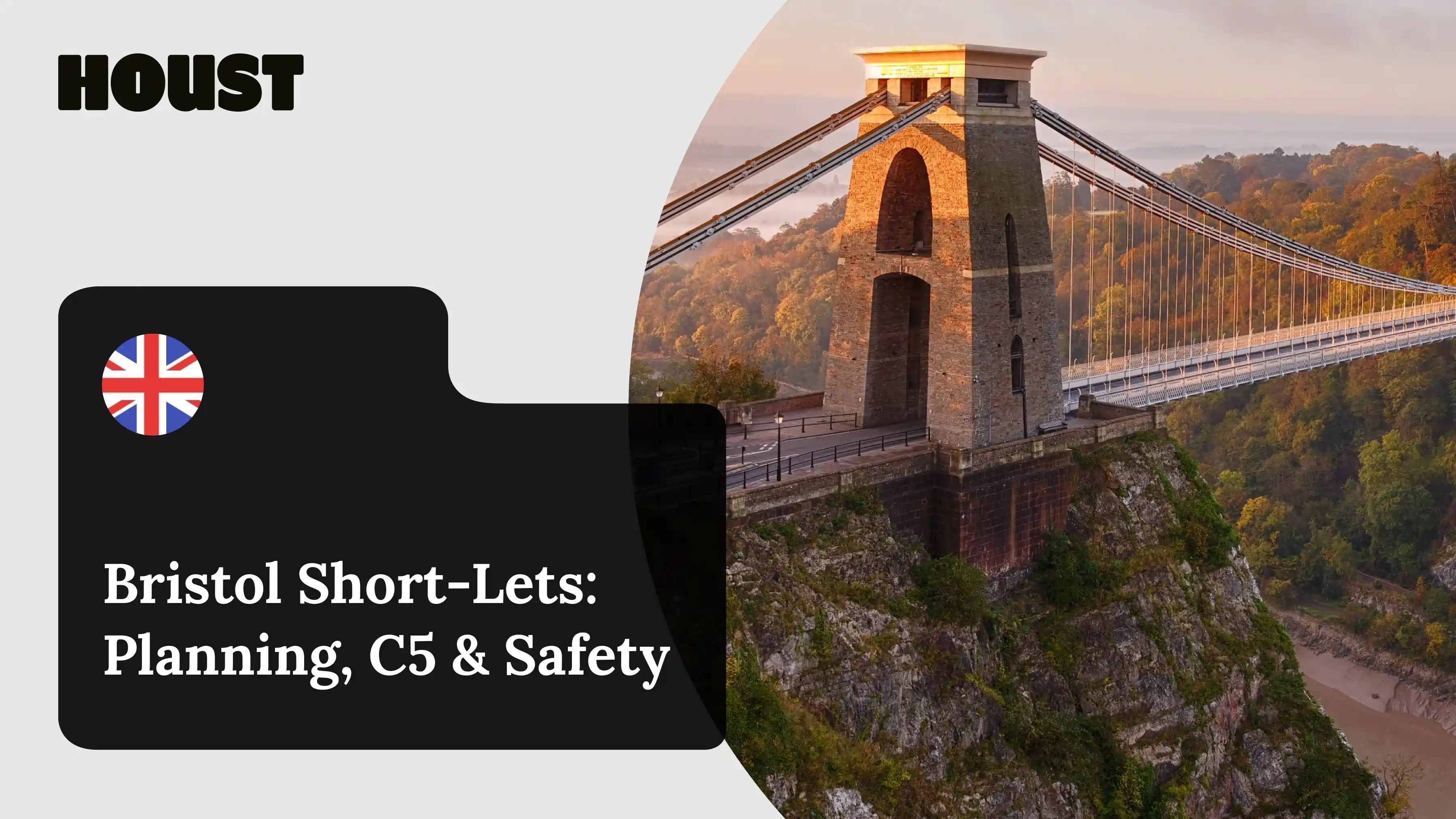TL;DR
- Bristol has no citywide night cap. London’s 90-night rule does not apply here.
- Whole-home short-lets are planning led and can count as a material change of use, decided case by case.
- The council provides an enforcement route for suspected planning breaches.
- England has confirmed a new C5 use class and a mandatory national register, but neither has started yet.
- Hosts should complete a fire risk assessment and keep it under review.
- If your place is available for at least 140 days and actually let for at least 70 days in the previous 12 months, it may be assessed for Business Rates instead of Council Tax.
Table of Contents
Is short-term letting legal in Bristol in 2025?
Yes — but it’s planning-led and case-by-case. Across England, using a dwelling (C3) as an entire-home holiday let/serviced accommodation can amount to a material change of use depending on intensity and amenity impacts; councils decide on the facts of each case. In Bristol, you can report suspected breaches via the planning enforcement service.
What’s changing nationally (confirmed; not yet commenced)
The Government has confirmed a package for short-term lets in England:
- A new use class (C5) for STRs and planning permission for future STRs where applicable.
- A mandatory national register (to be delivered by DCMS).
Status: start dates depend on secondary legislation; councils may later use Article 4 to withdraw any C3↔C5 permitted development (PD) in defined areas.
Bristol angle
- Expect a clearer planning status for entire-home STRs (C5) once commenced.
- Article 4 context: Bristol already applies Article 4 Directions in specific areas (largely HMOs/heritage), showing active use of PD-withdrawal powers; there is no STL-specific Article 4 in force as of 24 Sept 2025.
Contrast with London: the 90-night cap is Greater London-only; Bristol relies on planning control.
🚀 Build a Thriving Airbnb Business with Houst
Monetize short-term rentals without owning property. Our Airbnb Business Partnership Program helps you start, scale, and automate a profitable Airbnb business with smart pricing, automation, and expert support.
💡 No Property Needed
📈 Expert Growth Strategies
🤖 Automated Hosting Tools

⭐ Rated 4.8/5 by 2,500+ Hosts

🧼 Airbnb Cleaning & Turnovers, Done Right

⭐ Rated 4.8/5 by 2,500+ Hosts

Tax & rating: when a Bristol STL moves to Business Rates
In England, a self-catering/holiday let is assessed non-domestic if it’s available to let for 140+ days and actually let for 70+ days in the previous 12 months. The VOA then sets a rateable value (relief schemes vary by year). Bristol has a dedicated holiday-lets business rates page. If you do not meet 140/70, you remain on Council Tax; Bristol will apply a 100% premium to second homes from 1 April 2025 (subject to listed exceptions).
🚀 Build & Grow Your Airbnb Business with Houst
Turn your expertise into a profitable Airbnb business — without owning property.
Join Houst’s Airbnb Business Partnership Program to start, manage, and scale with ease. Get expert support, automation tools, and smart pricing strategies to maximize earnings and grow faster.

⭐ Rated 4.8/5 by 2,500+ Hosts


⭐ Rated 4.8/5 by 2,500+ Hosts

Fire & safety: what Bristol hosts must do (England)
All paying-guest accommodation must comply with fire safety law. For small STRs, use the Home Office guide “Making your small paying-guest accommodation safe from fire” (with risk-assessment checklist). Do the following and keep records: fire risk assessment; appropriate detection & alarm; clear/protected escape routes; CO alarms where required; fire blanket/extinguishers where proportionate; routine testing & maintenance logs.
Want a simple summary of caps, planning and safety just for this city?
Mini How-To: Stay compliant in Bristol (step-by-step)
- Map your use today — If you’re running an entire-home holiday let/SA, assume the council may view it as a material change of use depending on intensity/impacts; log bookings, add a management plan, and document neighbour-amenity measures.
- Check the roadmap — Prepare for C5 and the national register (not yet commenced). Watch for Article 4 consultations that could restrict C3↔C5 PD in hotspots.
- Fire safety now — Use the Home Office checklist; fix gaps; keep a maintenance log and guest safety info.
- Rates & tax — If you meet 140/70, expect Business Rates (check current relief schemes). If below, Council Tax applies; be aware of second-home premiums from 1 Apr 2025. Keep availability and lettings evidence.
- Neighbourliness/amenity — Clear house rules, waste plan, and quiet hours reduce complaints (a planning risk) and support any application or enforcement response. Use Bristol’s planning enforcement page if needed.
- Re-check annually — Rules are evolving; revisit planning/rating/safety each year and before scaling.
Curious how Bristol fits into England-wide changes like C5 and the national register.
FAQs
Is there a 90-night cap in Bristol like London?
No. The 90-night limit is Greater London-only. Bristol controls STLs through planning.
Do I need planning permission for an entire-home Airbnb?
Possibly. Whole-home STLs can be a material change of use depending on intensity/impacts; Bristol handles this case-by-case and can enforce.
What is the new C5 use class?
A dedicated short-term let use class for England; Government also plans a mandatory register. Start dates depend on secondary legislation; councils can restrict C3↔C5 through Article 4 where justified.
Will I have to register my Bristol STL?
Yes — once the national register commences, registration is expected to be mandatory (watch DCMS updates).
When do I move from Council Tax to Business Rates?
When the property is available ≥140 days and actually let ≥70 days in the previous 12 months; otherwise Council Tax applies (with potential second-home premiums).
What safety standards apply?
Follow the Home Office small paying-guest accommodation guide: risk assessment, alarms, escape routes, CO alarms, fire blanket, and maintenance logs.
Not Advice: This guide highlights key points for short-term letting and is not legal or tax advice. Rules change — always check the relevant authority’s website for your property and seek professional advice if unsure.
.webp)
.webp)
🚀 Start & Scale Your Airbnb Business with Houst
Join Houst’s Airbnb Business Partnership Program to start, manage, and grow your short-term rental business. With expert marketing, automation tools, and dynamic pricing strategies, we help you maximise earnings and scale faster.

⭐ Rated 4.8/5 by 2,500+ Hosts







